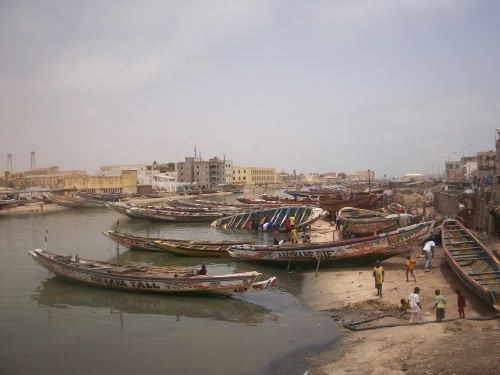
Boy riding train across the Öresund Bridge, Øresundsbroen, Denmark (Nicolas Azel)
There I stood at the crossroads of dust and dustier. I stared at the sign once more, “Garage.” Here we would find a car to take us into town, where we could find a bus back to Saint-Louis. I stood helplessly next to my Mauritanian companion Beccro, giving him desperate looks as a stampede of cows came towards us. By now, the idea of a stampede ending this nightmare of a journey seemed strangely appealing. I looked up at the sky for answers but the sun was only a reminder of my current state of frustration as it blistered my face like a cast iron grill. I went and sat under the only tree nearby, but the shade did little to calm my anger.
I had been living in Senegal for a few months when Beccro invited me to his home in Mauritania. The trip had proven to be full of culture clash and confusion. I had made my best efforts to integrate, but being 20 years old with no marriage prospects, I remained a puzzlement. Yesterday he had pulled me aside to explain that his mother was sick and that he had to return with her to Senegal for treatment. Our plans to travel on to Mali were put on hold.
Our travels began early in the morning. I was under the impression it was a simple car ride across the border, but I soon learned that this would not be the case. After hours of stumbling around in the market wasting time, I was quickly herded onto the back of a truck filled with bags of grain and water. Beccro was sitting across from me but had disappeared once again, this time into the market to find his mother. So there I sat, alone on the back of a stranger’s truck, all the while horrified it would pull away with only me on the back…and it almost did. Luckily, mother was found and we continued on our way.
After the deliveries were made, we were left at the side of a river. I was not told where we were, only to get into the pirogue to cross the river. We arrived at a village, where the cattle easily outnumbered the people, and were told our best prospect was a bus that passed by the edge of town. There I sat, confused, scared and angry. Beccro and his mother discussed plans in their native Pulaar while I sat reminiscing about my own home, in my own language.
I ached to be home, to be in Saint-Louis, Senegal, wandering through the back-alley markets looking for vegetables to make dinner, or perhaps a few yards of fabric, all the while the festive Toubab resonating in my ears. I thought about the girls I taught who giggled at the way I spoke, the street marriage proposals, Wolof language class, bottled water showers, all those mundane activities that had stolen into my life. Saint-Louis was the place I had taken to calling home. Everything that had initially irritated me had become the pieces that defined a typical day. Through my sweat, sunburn and sheer exhaustion, I smiled and told myself if I had made it this far, I could make it home.
The sun had started to set when the bus came by taking us to the next town. Here we took a horse cart to a bus going in our direction. I happily boarded and took a seat. As the bus pulled away, I realized Beccro had stayed behind to help his mother. This little tidbit had gotten lost in our broken communication. I was alone for the last leg of the journey.
Just before midnight I arrived in a town, but it was not Saint-Louis. As I was getting off the bus I felt a rip in the side of my dress. My zipper had broken. A man helped me find another bus going toward Saint-Louis, and, after informing him I was married, he left me to fend for myself.
Alone.
I sat and waited as I choked back tears of helplessness. I saw a girl sitting across from me and I asked, in the best French I could muster, where we were and where the bus was going. I explained I was alone, and she looked me straight in the eye and said, “In Senegal, no one is alone.” She gave me a safety pin for my dress. My dignity restored, she took my hand and guided me to a different bus. This simple act of kindness touched my heart. This girl restored my faith; she is my symbol of goodness. Her kindness is unmatched by anything I have ever experienced.
Finally, around 2:30 in the morning, I arrived back at the university. There I stood, at the door of happiness, at my home—home in Saint-Louis, Senegal.
—Laura Martin
From Aleph 8












